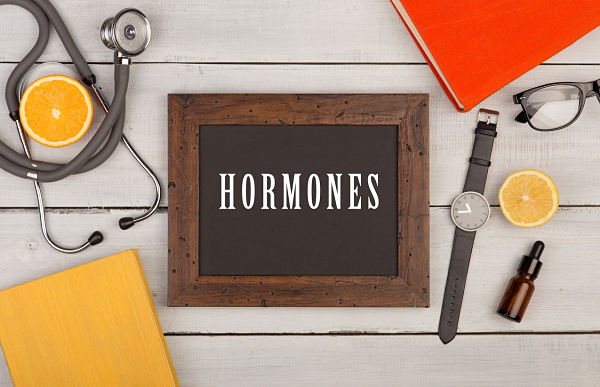Ten of the most important hormones in your body and what they do

Often referred to as “chemical messengers” hormones provide internal communication between cells and play a crucial part in our body’s growth, development, metabolism, sexual function and reproduction and how it deals with exceptional situations like giving birth (see this blog post)
There are many hormones – some of which like adrenaline, insulin or testosterone you will have heard about, but there are other important hormones which I suspect you’ve not heard about unless you know someone who’s been experiencing a problem with part of their endocrine system.
For example you almost certainly will not have heard about triiodothyronine or thyroxine – often referred to as T3 and T4. These are produced by the thyroid gland, and between them have the important roles of controlling our metabolic rate; the function of your heart, muscles and digestion; your brain development and function; and the maintenance of your bones.
You may not have heard of aldosterone either, and yet this has the crucial role of regulating the salt and water in our bodies. Produced by the adrenal glands, it helps the kidney and colon to improve the absorption of sodium into the bloodstream. It simultaneously causes water to be absorbed and this increases blood volume and affects blood pressure.
Your adrenal glands also produce cortisol which helps with energy but is also vital for life because it helps your body respond to stress, infections, physical accidents and surgery by regulating your blood pressure, metabolism, inflammatory response and the function of your heart and blood vessels.
We mentioned them earlier, so let’s look in more depth at what adrenaline, insulin and testosterone do…
Produced by the adrenal gland, adrenaline prepares our body for quick, vigorous action in times of stress. This is known as “fight or flight” amazingly the process kicks in within a couple of minutes of experiencing a stressful occurrence.
You may think of insulin in connection with the treatment of diabetes. This is because it is given to boost our naturally produced insulin when our body has an insufficient quantity. Produced by the pancreas, the main role of insulin is to help the body to absorb glucose as energy (glucose is created after our body has broken down carbohydrates)
Testosterone is associated with men but you might be surprised to know that it’s also present in women (although in smaller quantities) It is produced by the adrenal gland in both sexes and by the testes in men and the ovaries in women. Its function in both sexes is to signal the creation of new blood cells and help bone strength and muscle development and maintenance. It is also responsible for libido.
In men testosterone is the hormone that is vital for many of the post puberty characteristics of an adult male. This includes the deepening of the voice, the development of facial and body hair and the growth of the penis and testes, and sperm production.
Oestradiol is the most potent of three oestrogen hormones, the other two being oestriol and oestrone. Oestrogen is produced by the ovaries and is in much higher quantities in women than men. The main function of oestradiol is to help mature and maintain the female reproductive system.
How does our body know when it should enter puberty? This is all down to two hormones produced by the pituitary gland. These are called follicle stimulating hormone (FSH) and luteinsing hormone (LH). I talk in more depth about this here
I hope this has given you greater insight into the world of our chemical messengers? If you enjoyed this blog post you might like this one on the endocrine system itself
Although every effort is made to ensure that all health advice on this website is accurate and up to date it is for information purposes and should not replace a visit to your doctor or health care professional.
As the advice is general in nature rather than specific to individuals Dr Vanderpump cannot accept any liability for actions arising from its use nor can he be held responsible for the content of any pages referenced by an external link










